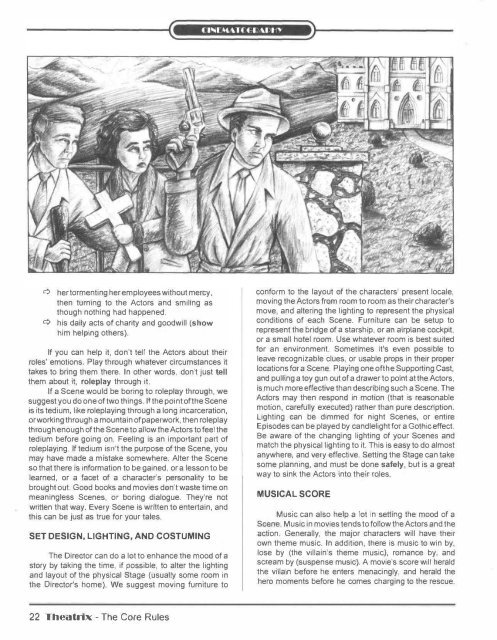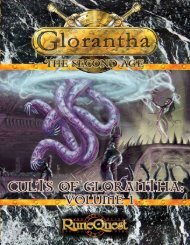Untitled - Index of - Free
Untitled - Index of - Free
Untitled - Index of - Free
Create successful ePaper yourself
Turn your PDF publications into a flip-book with our unique Google optimized e-Paper software.
c;> her tormenting her employees without mercy,<br />
then turning to the Actors and smiling as<br />
though nothing had happened.<br />
c;> his daily acts <strong>of</strong> charity and goodwill (show<br />
him helping others).<br />
If you can help it, don't tell the Actors about their<br />
roles' emotions. Play through whatever circumstances it<br />
takes to bring them there. In other words, don't just tell<br />
them about it, roleplay through it.<br />
If a Scene would be boring to roleplay through, we<br />
suggest you do one <strong>of</strong> two things. If the point <strong>of</strong> the Scene<br />
is its tedium, like roleplaying through a long incarceration,<br />
or working through a mountain <strong>of</strong> paperwork, then roleplay<br />
through enough <strong>of</strong> the Scene to allow the Actors to feel the<br />
tedium before going on. Feeling is an important part <strong>of</strong><br />
roleplaying. If tedium isn't the purpose <strong>of</strong> the Scene, you<br />
may have made a mistake somewhere. Alter the Scene<br />
so that there is information to be gained, or a lesson to be<br />
learned, or a facet <strong>of</strong> a character's personality to be<br />
brought out. Good books and movies don't waste time on<br />
meaningless Scenes, or boring dialogue. They're not<br />
written that way. Every Scene is written to entertain, and<br />
this can be just as true for your tales.<br />
SET DESIGN, LIGHTING, AND COSTUMING<br />
The Director can do a lot to enhance the mood <strong>of</strong> a<br />
story by taking the time, if possible, to alter the lighting<br />
and layout <strong>of</strong> the physical Stage (usually some room in<br />
the Director's home). We suggest moving furniture to<br />
22 Theatnx- The Core Rules<br />
conform to the layout <strong>of</strong> the characters' present locale,<br />
moving the Actors from room to room as their character's<br />
move, and altering the lighting to represent the physical<br />
conditions <strong>of</strong> each Scene. Furniture can be setup to<br />
represent the bridge <strong>of</strong> a starship, or an airplane cockpit,<br />
or a small hotel room. Use whatever room is best suited<br />
for an environment. Sometimes it's even possible to<br />
leave recognizable clues, or usable props in their proper<br />
locations for a Scene. Playing one <strong>of</strong>the Supporting Cast,<br />
and pulling a toy gun out <strong>of</strong> a drawer to point at the Actors,<br />
is much more effective than describing such a Scene. The<br />
Actors may then respond in motion (that is reasonable<br />
motion, carefully executed) rather than pure description.<br />
Lighting can be dimmed for night Scenes, or entire<br />
Episodes can be played by candlelight for a Gothic effect.<br />
Be aware <strong>of</strong> the changing lighting <strong>of</strong> your Scenes and<br />
match the physical lighting to it. This is easy to do almost<br />
anywhere, and very effective. Setting the Stage can take<br />
some planning, and must be done safely, but is a great<br />
way to sink the Actors into their roles.<br />
MUSICAL SCORE<br />
Music can also help a lot in setting the mood <strong>of</strong> a<br />
Scene. Music in movies tends to follow the Actors and the<br />
action. Generally, the major characters will have their<br />
own theme music. In addition, there is music to win by,<br />
lose by (the villain's theme music}, romance by, and<br />
scream by (suspense music). A movie's score will herald<br />
the villain before he enters menacingly, and herald the<br />
hero moments before he comes charging to the rescue.



